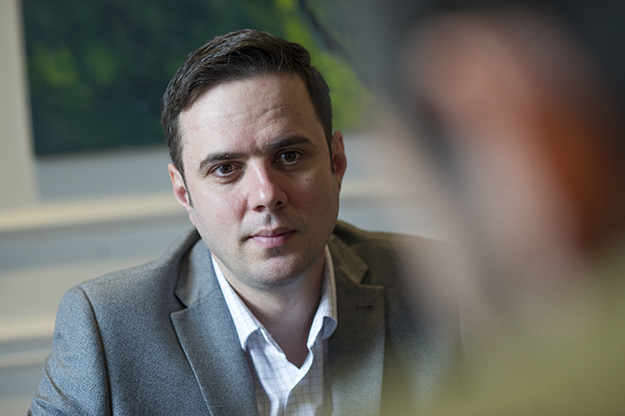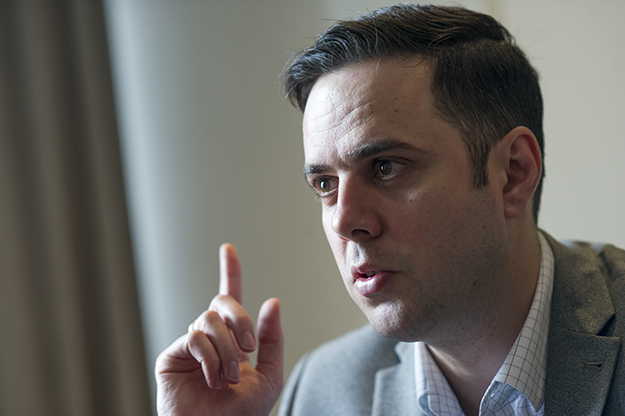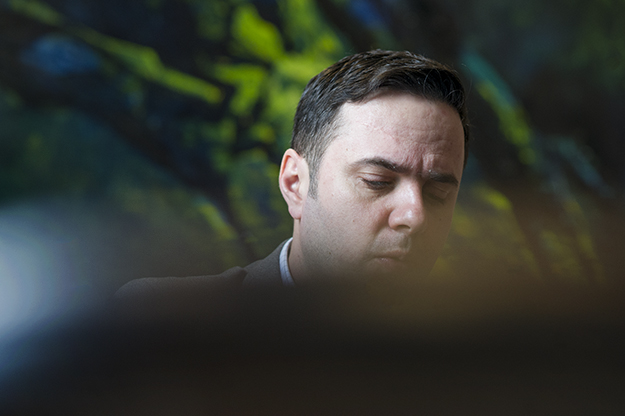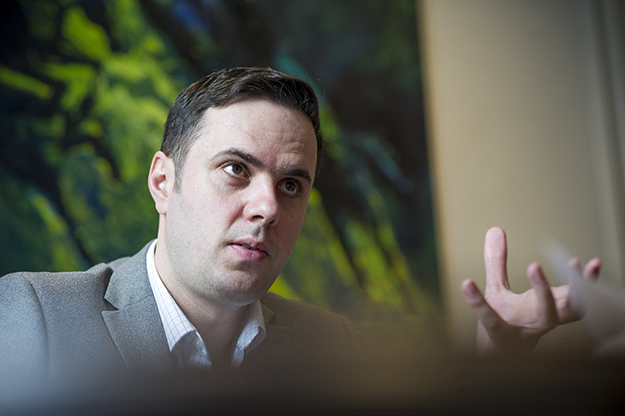Lumir Abdixhiku joined the Democratic League of Kosovo (LDK) one month before the 2017 general parliamentary elections. The need for fresh blood at LDK got him involved in politics for the first time, but thanks to the experience he gained working in civil society for many years, Abdixhiku managed to win 29,000 individual votes from the LDK electorate, making him one of the five most voted deputies in the party.
Abdixhiku is proud of LDK and its past, its tradition and history. He strongly believes that the new generation should not quarrel with the old but should cooperate to achieve common goals.
Abdixhiku, an economist by profession, has worked in the past as a director of the RIINVEST Institute and wrote articles for the Koha Ditore newspaper on a regular basis. He was known for criticizing political parties, especially the Democratic Party of Kosovo (PDK). His discourse has not changed, as he continues to harshly criticize PDK and their coalition, a line he promises to continue as an LDK member.
In an interview with Kosovo 2.0 he speaks about his perspectives on politics and the potential for change in Kosovo.
K2.0: You entered politics in May 2017. During your time with LDK, what has surprised you most about political life?
Lumir Abdixhiku: I’ve been engaged in political life since 2005 as part of civil society. Politics is an inseparable part of civil society. But with the party, it is true, I have only been engaged with them in the last 18 months. For me it was another step in my professional life. When I say this I mean that it will require my full dedication — I’ve abandoned my other engagements in civil society, with Riinvest [as executive director] and Koha Ditore.
There is a big difference between the political party and what I’ve done in the past. It is more about engagement and potential for change. It takes more engagement and you have no fixed schedule — there is no point where you stop working and go home. But there are extraordinary opportunities to influence different policies. I noticed these differences mostly when I entered the Assembly and started playing my part as deputy and as a member of the [Budget and Finance] Commission.
There is a general perception in society that when you enter politics, you kind of settle down and get comfortable. Do you believe that you are challenging this mentality?
I believe politics brings out what is really true about the individual. People will generally transmit their style of work to the world of politics after working in other sectors. I do not see politics as a profession that makes you comfortable. In fact, I’d say my old profession is a more comfortable one. I had more time in the past. I endured less headaches and I was under less pressure when making decisions.
I do not see it as something that has made me more comfortable, rather it is the next step in my career, albeit one that brings extraordinary opportunities for change. If you want to change things, politics is the frontline for achieving this before retirement. For me, politics is just the start.
You have been quite vocal at the Assembly, taking on different legislative initiatives. What lessons have you learned from parliamentary life during your time as deputy?
I was surprised by two things. Firstly, the level of bureaucracy in Kosovo’s institutions. There is excessive bureaucracy for issues that are very simple. Just a pile of papers and signatures. Secondly, it was a pleasant surprise to find out how much you can change with a bit of willingness. There was very little political will in the past.
Many issues and initiatives that I have raised in the Commission were issues of political will, issues that were over discussed in our circles and that could have been solved with a bit of willingness and work. This was good news, because if you only need a bit of political engagement and willingness to push a decision forward, then we have everything we need to achieve our aims.
When we talk about change and opportunities in politics, we know that they are often made possible by political parties. In this case, you are engaged with LDK, which is seen by others as a party for “older generations.” With the arrival of people like you, Driton Selmanaj and others, many have spoken of reforms within LDK. However, the old guard still has decision-making power at the Headship and the General Council of LDK. One year on, how much do you think LDK has been strengthened by these new additions and do you think you have the potential to reform LDK?
We must know the difference between a big party that has traditions, and a new entity that does not. It is natural for a big, traditional party that has a history of over 30 years to have different generations. There are people in LDK who have been here since the party was established. There are others that have joined the party in different periods, and there are people like me and other colleagues who joined recently. In such an environment, the first thing you need to do is find common ground, because everyone has good elements that they can bring to the political organization.
We have been given the best opportunity to prove ourselves, rather than be obstacles to the proper organization of the political party. We had our space even during the election campaign, and in parliamentary life. We have parliamentary positions in commissions, but we also have good support from the electorate. So we have common grounds of communication.
Naturally our partisan position cannot be advanced at this stage, because let us not forget that [internal] elections cannot be organized in LDK until mid 2019, and it would be absurd to co opt these people in an organization after democratic elections within the structure. As current trends are going, we are all getting used to one another.
Different critics see this attitude as a situation in which LDK is using you as a facade. Do you fear being used by the party up until a certain moment, until the old guard can maintain true power? For example, deputy Driton Selmanaj recently commented on Shpend Ahmeti’s separation from Vetëvendosje, saying ‘Shpend Ahmeti is welcome at LDK.’ The vice president of LDK, Agim Veliu, reacted immediately, saying that membership invitations cannot be made on TV. This was regarded as criticism against Selmanaj, which leads us to believe that the old guard is prepared to intervene in the affairs of new LDK members.
I believe it is an unimportant issue that has been amplified by the media. It was not a big internal issue.
However, it shows us how the party reacts to issues which you deem to be unimportant…
You should see the level of our disagreements when we have internal discussions. In the last few months, LDK has dealt with big issues, from the Specialist Chambers to the demarcation process. We have debated endlessly over these issues. These are not decisions that can be reached overnight. They stem from all of us.
You should believe in the character of the new generation and know that we would never accept anything less. We are not trying to hide a situation of conflict, but I am honestly telling you that there is no such situation.
We can believe in you, but you must know that for years LDK has functioned like this; decisions were made by a small group of powerful people within the party. The way LDK has functioned in the past leaves room for skepticism. Why is it different now?
However, LDK has also shown another side. It has shown that it is democratic and that it can make changes in its leadership, with processes that are completely democratic.
You are talking about when Isa Mustafa withdrew his candidacy from the prime ministerial race in the 2017 elections?
Yes. It is an important process in the current political environment. People never even consider such processes happening in other political parties. I am not saying that LDK is perfect, but in key points it has shown a higher level of democracy than other parties. This stems from its traditions. With time, it improves and matures.

Photo: Atdhe Mulla / K2.0.
But many have seen this process as a controlled transition, because individuals who are close to Mustafa have political power within LDK. What do you think?
No, no. We wouldn’t want a controlled transition, rather we want a consensual transition. When I say this, I am not talking about a war between generations, between age groups. The battle is about expanding LDK with elements which were missing from it in the past. LDK was never extended to the youth, rather it was extended to other structures which had ties with LDK.
But if we say that only the younger generation is valuable, we would neglect LDK’s history and traditions. We know that LDK’s key element is getting people together and targeting every group. We will deal with internal issues in a unified manner. So there is no conflict. Honestly, the conflict has been imagined. It is what our political opponents wish to see. Up until now, this unity and understanding has changed LDK. It is now more secure in different processes, and it will be seen as more competent.
Do you believe that the “generation of the Republic” will be able to reflect on newly gained power within LDK after the 2019 internal elections? I think that is going to be the real test of whether LDK’s transition is controlled or a reflection of the 2017 elections, in which LDK’s electorate showed that they want change, despite the fact that within the party you have figures who have historical weight.
Where we differ in this thesis that you have presented to me is that I do not see it as a transformative battle, in which one side substitutes the other. The concept I am talking about and we are thinking about is building a common path in which generations and ideas flow together.
Do you believe that this is possible?
It is necessary. If one side wins, LDK will not come out strong in the next elections. What I’m trying to say is that we, as LDK, should be smart enough to know that we need to follow a common path and that we all need to contribute. This is the only solution, because we are not too concerned about transforming LDK, as much as we are about transforming Kosovo. We are not seeking radical transformation. We want to further our traditions with new energy, and eventually improve the party.
You say that LDK needs continuity, but on the other hand, in the past decade LDK has made political maneuvers, for example twice sharing power with PDK, a party which it has labelled as its biggest political opponent. How are you so sure that you will bring change when continuity would mean having the same attitude and working with the same political forces?
I am part of the group that has criticized the coalition with PDK and has sort of drawn a red line between us and them, for reasons that I have elaborated on in recent years. Secondly, there are LDK voters who have articulated that they seek a clear separation between LDK and PDK. Thirdly, LDK has a clear stance. It has listened to its voters, to the citizens, and it will now push forward its political agenda. It will be a part of our political platform and engagement.
At this phase, LDK has no intention to form a coalition with PDK, because it is clear that such a tendency would damage the party. LDK cannot form such a coalition once again. I believe that rationality will dominate every other interest, if there are others.
Lately LDK has been vocal in its requests for new elections, alluding to bad governance. On the other hand, historically you’ve been a part of civil society, continuously speaking about the dysfunctionality of the legal state, the high level of corruption, the lack of economic development, the stagnation in our efforts for Euro-Atlantic integration etc. In the past 17 years, LDK has also played a part in local and central governance. Why is LDK different now? Why should we trust you?
Once again, I tend not to agree with the way you are formulating these questions. In the last 17 years, LDK should not be ashamed of what it has done. In the last 17 years, LDK has had historical moments, for which it is proud.
Which moments are you talking about?
The Vienna negotiations, the independence process.
All other parties and actors are proud of these processes….
LDK has led the country and its relations with internationals. PDK was destructive at that time. If you recall, PDK burned flags. Their transformation happened in 2010. I believe the state was then captured.
LDK was a limited part of Kosovo’s power, but it cannot be held equally responsible for not stopping other parties. If there is something that we do not agree with, we can do that, but the extent of the capture of the Kosovar state, the influence on courts, the police and public institutions… it is proportionally leaning towards PDK.
And its former partners…
Mainly towards PDK. There are no LDK people in courts and the police force. These are state mechanisms. It was proven during the “Pronto” affair. Key PDK actors employ people in the state’s main pillars. There are no LDK people there, and there were none in the past 17 years. None after independence either.
If you cannot form a coalition with PDK, then on the other hand, looking to the opposition, it is not that you have better relations with Vetëvendosje. Your relations with AAK and Nisma have also suffered in the last couple of years. If you aim to win power in the next elections, you’ll need partners, because in the Kosovar political system it seems difficult for one party to win the majority of votes and govern the country alone. Who will LDK’s next partners be?
I do not want to say any names because it is a hypothetical situation, and if I’ve learned anything from my first year in politics it is that you shouldn’t answer hypothetical questions because you create situations and scenarios that naturally cannot be measured. What I’m trying to say that LDK aims to be first and have as many deputies as possible so as to not be dependent on any other political party.
This seems impossible, seeing the relations between the political forces…
I do not think that it’s very hard to achieve. I honestly do not think it’s hard for LDK to win 40 seats in Parliament. With current political trends and competition, if LDK follow the right path, it will be the only sustainable and normal alternative for Kosovo. If such a thing happens, 40 seats is very achievable. Then we can choose a smaller partner which will adapt to our center-right orientation. So our program orientation is a priority.
Do you believe that there are other parties with such an orientation?
That is why we are members of EPP [European Popular Parties, a European transnational political group]. There are certain standards.
But your membership in EPP does not necessarily mean that you will apply such policies…
We must seek this. If we want political change, we must talk about programs and ideas. In the last session we had an excellent debate between the left and the right. There was not a lot of coverage from the media, but it was good, content-wise. This is the language and level that we must bring in the future. I want to know what other parties think about healthcare services, how they want to solve the healthcare issue, using what model etc.

Photo: Atdhe Mulla / K2.0.
All the parties have the same model for healthcare services, but none of you have actually solved this big issue.
We must do it using our program and our ideas. That is what I’m saying. Or when we talk about pensions, or the number of ministries, the public administration, taxes… these are issues we should talk about, because there are no bigger issues…
But LDK has not proven itself as a center-right party in the past. In fact it has focused solely on social policies…
Exactly. It should improve.
Where should it improve?
I believe that we must clearly articulate what we represent politically. I’ll tell you something you don’t know. In the coming days we will launch a new governance platform.
You will launch a new governance platform?
Yes. We will present citizens with our future policies. And from now I can guarantee that they are center-right policies. They are political ideas that are based on our program orientation.
Why do you believe that Kosovo needs right wing policies?
For many reasons. We believe in these policies.
You believe they fit the current momentum? We have a high level of unemployment and it needs to be addressed.
It does not mean that the right wing is not pro jobs. The best social policies are related to jobs. We believe that firstly we must improve the business environment. Kosovo’s enterprises should have good access to capital, good working conditions. And we need to open new jobs. In the social aspect, we believe that we will bring social welfare by building a capital system through those benefits.
For example, we see health insurance, pensions and education through the principles of a market economy. So we approach problems with an approach that takes into consideration our ideology and beliefs. The ideological aspect also has the part of the Republic. We believe it is an inalienable part of Kosovo. And also we do not question the aspect of Euro integration. When you put the two together, you see what LDK stands for.
Let’s get back to another issue. Before becoming engaged in LDK, you wrote against the creation of the Association of Serb-Majority Municipalities, the agreement for which was signed by LDK in 2015. Afterwards, the Constitutional Court ruled that the agreement was “not in the spirit of Kosovo’s Constitution.” Will you continue to be against the formation of the Association?
I believe that LDK’s stance on this is in accordance with the constitutional interpretation. So LDK’s political stance is that we support such an organization as long as it is in accordance with the Constitution.
But you know that the Serbian parties have made it clear in Brussels that they will only accept the agreement which was signed by Isa Mustafa and the Serbian Prime Minister in August 2015…
We really don’t care what the Serbian parties think. We care about our institutions. Is there any institution in Kosovo that can go beyond the constitutional interpretation? Is there anyone that can change the Constitution of Kosovo while counting on our votes? No, there isn’t.
Could it be President Thaçi? He is seen by internationals as someone who could potentially push forward the formation of the Association of Serb-Majority Municipalities?
I see Mr. Thaçi as someone who is desperately trying to have a role in Kosovar politics. With all that is happening, he is trying to be a factor, and I do not know for what reason. But there is a logical discrepancy in the way Kosovo’s institutions function. The President cannot negotiate in Kosovo’s name because he has no executive powers.
President Thaçi has stated that according to the Constitution, he is the representative for foreign affairs…
However, he has no judicial means to implement the Brussels agreements. So, a minister cannot communicate with the President to implement an agreement. The minister must communicate with the Prime Minister. And on the other hand, there is no institution that oversees the President, whereas the Prime Minister is overseen by the Parliament. Thus, without executive powers, the President is useless in the dialogue. However, he is useful for Vučić. He has a ceremonial role which is defined by the Constitution of the Republic.
Is it only a ceremonial role though? Because for the demarcation issue, Thaçi signed the key agreement with his Montenegrin counterpart, one which was supported by your party as well…
To be honest, that agreement has no effect. We have said that an agreement [such as the annex agreement between Thaçi and Vujanović for the demarcation process] which is not ratified by both parties is unimportant to us. That agreement served to convince Mr. Ramush Haradinaj that something has changed. But in international relations… anyone who know anything about international relations also knows that agreements must be ratified by both countries so as to be valid.
So what I’m trying to say is that Thaçi can try to be a protagonist, but in principle LDK believes that the Government of Kosovo must deal with these processes as it has a mandate to do so.
You do not hesitate to criticize Thaçi for his interventions, but LDK never seems to criticize the EU for pushing such a dialogue process at the presidential level. What do you say to the claims that LDK is so constructive towards the international community that it sometimes forgets about itself?
I do not believe that this has been the case. Trust me, it is not like that. We have continuously had good communication with the international community. We share our opinions and demands. And believe me, we do this so much and defend our convictions so much, that we often achieve our aims. We understand international pressure. It is a part of politics. Politics does not function without international pressure. Furthermore, even countries which are much more powerful than Kosovo are affected by international pressure.

Photo: Atdhe Mulla / K2.0.
But does LDK complain when the international community pushes certain individuals, in this case the President of the country, to make decisions that might potentially go beyond the Constitution. What is your role?
That is exactly when we complain. We are talking about an institutionalist spirit. We do not consider the individual. We consider Mr. Thaçi as problematic for the way he plays his presidential role. He favors certain political parties, intervenes in election processes and is incompetent to fulfil his constitutional role. So before internationals, we deal with the issue in an institutional manner. So we say that a President who is not overseen and has no executive power cannot lead the country.
But even internationals have interests which are not necessarily in line with Kosovo’s interests. Or maybe you don’t agree with this?
I absolutely agree with you. First of all, there is the stability of the region. It is often not a variable which works in our favor. When they tell us to “wait a bit more” because of the issue of stability, this doesn’t work in our favor either. In such circumstances, we make our demands to them and simultaneously implement our internal policies.
How much do you hold the international community responsible for the way Kosovo has functioned as a state after it declared independence? Let’s not forget that international bodies had executive competences in the judicial branch for a decade.
Depends on the field.
Let’s take rule of law. Before you said that the legal state is not functioning, but EULEX has had executive responsibilities for fighting high level corruption within the government.
They didn’t stop us. We had our prosecutors and judges. Locals had executive power too. So I’m trying to say that I’m not exculpating internationals for issues which they have influenced, especially regarding rule of law. In my opinion, it is a failed mission. It has not lived up to its expectations. But for international admissions, [the international community] have played a key role. Kosovo wouldn’t have been able to gain membership in sports and political organizations if it wasn’t for them. In environments which have been influenced by Russians and other forces, they’ve played a decisive role.
But for certain things, we are also guilty as a society. In education, they have not influenced anything since 2008. Look what has happened there. In healthcare too. Look at our hospitals. That was not done by [the international community]. Locals have had competences in the judicial branch too. There are many basic things that we must deal with and insist on. Although we are lacking in internal issues, we have highlighted external issues, which are not unimportant, but if we were stronger in our internal affairs, we would be better off with our external affairs as a result.

Photo: Atdhe Mulla / K2.0.
How do you see Kosovo’s future and LDK’s role in Kosovar politics in the next 10 years?
The next 10 years will be a decisive period for Kosovo. 2020-2030 will be the years in which Kosovo will either be shaped as a European state with European parameters, or will become a failed state. Whether we like it or not, with all its defects, LDK is the main element of this decade, and we must have a leading role in Kosovo, so as to lead Kosovo towards the EU and NATO. This is LDK’s political vision. So LDK is the only solution. What else do we have? One the one hand we have PDK, with their style… creating three problems overnight and solving four in the morning… and then we have the revolutionaries who say “maybe this state shouldn’t exist… and then there’s us, LDK.
Who are you? The old or the new?
We are all together. I am LDK. And there is no new or old LDK. We need an LDK that brings us together with the ones that were here before, the ones who joined later, and the ones who will join in the future. When we do this, we will be the political alternative that Kosovo needs.
At the end of the day, politics is not permanent. Everyone at some point can contribute. I am not permanent either. I have a small window and when my opportunities are finished, another will come after me. Politics is not the first or last station of my political engagement.K
This interview has been edited for length and clarity, it was originally conducted in Albanian.
Feature image: Atdhe Mulla / K2.0.





